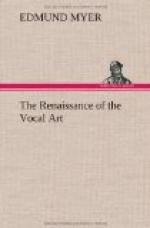“The New Movement” is simply a study of the conditions which allow the phenomena of voice to occur naturally and automatically. The day will come, when a right training of the voice will be recognized as a flexible, artistic, physical training of the human body, and a consequent right use of the voice, as a soulful expression of the emotional nature. Matter or muscle will be taught to obey mind or will spontaneously. The thought before the effort, or rather before the action, will be the controlling influence, and vitalized emotional energy will be the true motor power of the voice. The elocutionists and the physical culturists understand this far better, as a rule, than the vocalists.
Abuse brings reform in art as well as in all other things. So the abuse of Nature’s laws and the lack of common sense in the training of the singing voice has led, through a gradual evolution, to “The New Movement.” This movement is the outgrowth of the best or advanced thought of the profession rebelling against unnatural methods.
In the fundamental principles of “The New Movement,” there is nothing new claimed by its advocates. All is founded upon the science of voice, as are all true systems of teaching. The claims are made with regard to the devices used to study natural laws, to develop the God-given powers of the singer. Remember that Nature incarnates or reflects God’s thoughts and desires and not man’s ideas or inventions. Someone has said that there was nothing new, nor could there be anything new, in the art of singing. There are many, alas! who talk and write as did this man. Is not this simply proof of the fact that ignorance cheapens and belittles that which wisdom views with awe and admiration? And this is true of nothing so much as it is of the arts and sciences.
Is, then, ours in all the world, the only profession based upon science and art that must stand still, that must accept blindly the traditions handed down to us, without investigation? Are we to feel and believe that with us progress is impossible, that we may not and cannot keep up with the spirit of the age? God forbid. Is it not true that “each age refutes much which a previous age believed, and all things human wax old and vanish away to make room for new developments, new ideals, new possibilities”? Is it possible this is true of all professions but ours? The signs of the times indicate differently. Hence we may confidently expect the Renaissance of the Vocal Art in this, the first half of the new century.
ARTICLE FIVE.
The coming school, or system.
This is an age of progress; and, as we have said, many educators are making a bold stand for natural, common-sense methods. The trend of the higher thought of the vocal profession is away from artificiality, and in the direction of naturalness.




